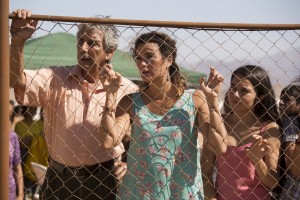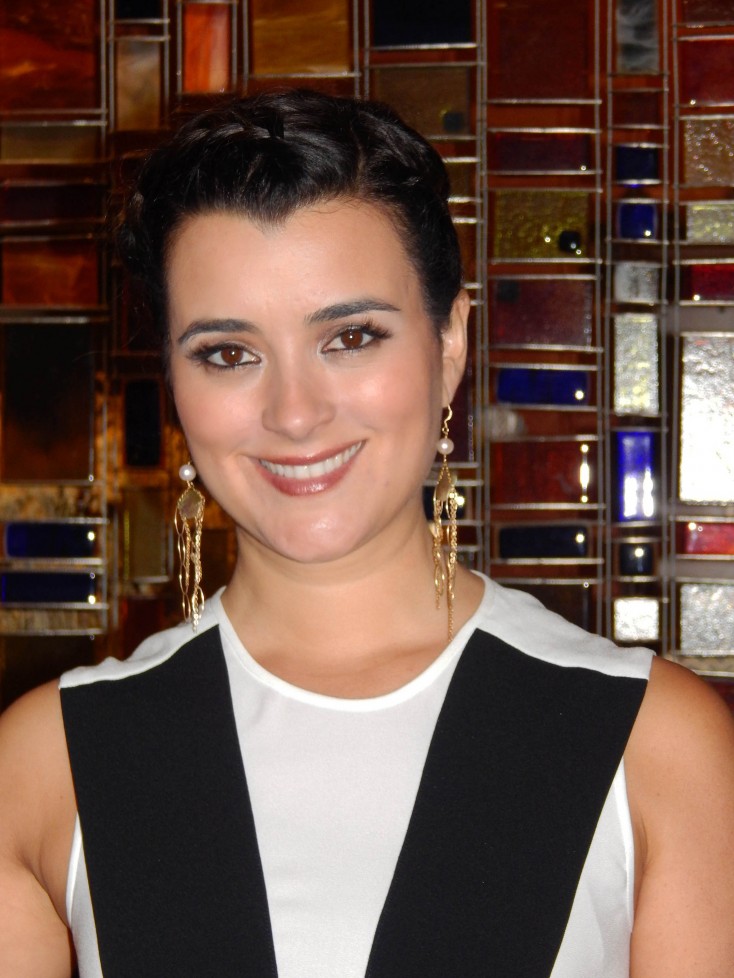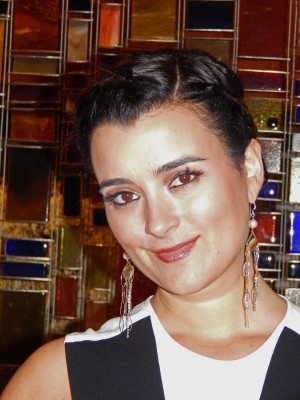
(l-r) Raoul Pinno as Don Jose and Cote De Pablo as Jessica in THE 33. ©Alcon Entertainment. CR: Beatrice Aguirre.
By LYNN BARKER
Front Row Features
ALBUQUERQUE, N.M.— Chilean actress Cote de Pablo is best known for her role as former Mossad officer Ziva David in the long-running “N.C.I.S.” TV series. Headed to Broadway to star in the musical “The Mambo Kings” when she booked the role on the popular show, the gorgeous de Pablo revealed in an interview that in addition to acting, she hopes to reignite her musical theater career.
In the new drama “The 33,” de Pablo plays Jessica Salgado, the pregnant wife of trapped Chilean miner Alex Vega (played by Spanish heartthrob Mario Casas). Directed by Patricia Riggen and co-starring Antonio Banderas, Rodrigo Santoro, Juliette Binoche and Lou Diamond Phillips, the suspenseful drama recounts the real life events that played out in 2010 over a period of more than two months, as rescuers tried to figure out how to rescue the trapped men after the copper and gold mine they were working in collapsed.
De Pablo sings an amazing ballad of hope around a campfire surrounded by many other women who waited 69 days for their men, who did what they could to survive inside the century-old mine, 200 stories below the surface. “The 33” is the gripping film based on that extraordinary event.
Born María José de Pablo Fernández in Santiago, Chile, de Pablo chose a nickname and spelled it Coty until she realized that her new “handle” was then a popular make-up line. A Carnegie Mellon University grad, de Pablo now lives in L.A., but often visits her mother in her native Chile. De Pablo chose the Andaluz Hotel, a classic, Spanish and Native American-style landmark in Albuquerque for an interview.
Q: You started your career in musical theater. Do you miss that and also, would you go back and do a long-running television series again?
De Pablo: I was about to do Broadway (“The Mambo Kings”) right before I got “N.C.I.S.” so it’s something still pending that I want to do. It never ended up going to Broadway. We went to the Golden Gate theater and there were too many things that the musical needed so we took a break then I booked “N.C.I.S.” so I went from my chance of doing a Broadway show into doing the series. I never thought a TV show could last that long but if it was the right material I would do it again. If there can be a balance between being professionally happy, being creatively stimulated and having a personal life, then yes.
Q: The song you, as Jessica, sing in “The 33” is just beautiful and so heartfelt. Had you known it before?
De Pablo: Patricia Riggen, the director, wanted that song “Gracias a la Vida.” It’s like an anthem of hope in South America. It’s a very well known song by Chilean (singer/songwriter) Violeta Parra. It became a very famous song after an Argentinean Mercedes Sosa sang it. It’s such a beautiful song and it is an ironic one to use at that particular moment of the movie because it literally translates to “Thank You Life.” Jessica is thanking her life for everything she has in a moment when she has given up hope of ever seeing her husband again.
Q: Did you speak to the real Jessica?
De Pablo: My character was one of the few that were a compilation of a couple of people. Many of the characters were exactly the people that were there but my character and a couple of others were a combination.
Q: That location In Colombia portraying the Chilean mine looked so stark and really dusty and dirty. How were the conditions while shooting there?
De Pablo: Kate de Castillo (who plays Katty Valdivia in the film) and I had the chance to go there because we are in the dream sequence (in which the starving, trapped men envision their loved ones and great food). I have to tell you that was tough for the guys. They were shooting in a salt mine in Colombia. It was very cold but they had to pretend it was very hot. They were freezing and sprayed with water all the time and on a massive diet. They were in a bad mood because they weren’t eating and were frozen so they kind of came together and had this camaraderie they found in that salt mine.
Q: Sounds very tough.
De Pablo: Well (she laughs), at that point they were just glad to see women! That sequence was Patricia’s idea and I don’t think a lot of people trusted that moment but I think it’s one of the best moments of the film. There’s a little bit of magical realism in that moment, a little bit Gabriel Garcia Marquez and some of our other wonderful authors in South America. It captures that dream state that we all have. In the worst of times your mind goes into really happy places to remove yourself from the situation you are presently living.
She was able to capture beautifully where these men were and what they were dreaming of. They were going through the experience together but each having their individual fantasy. Some of those had to do with “I’m going to see my wife again” or “Oh, I’m going to see Jessie (her character) and she is going to hand me a burger” or the one guy goes “Mom? I can’t believe you’re here.”
Q: That scene was darkly funny. Talk about working with Mario Casas as your husband. You have done a lot of American TV and he has done only Spanish TV and film. Did he ask for your advice on anything?
De Pablo: Oh, Mario. Yes, he did. For him it was a huge undertaking. Here is a man who had never done anything in English. He did a beautiful job but he was petrified. He had no idea how to do it. I think once he got out of his head and thought, “I can do this. This is fine,” I think he did a brilliant job. He’s THE sex symbol in Spain. Aside from being good-looking and talented, he’s a great guy. That man can open movies. Not bad to work with at all.
Q: You were born in Chile but didn’t grow up there. What do you think it is about the Chilean people that make them seem much stronger emotionally than others?
De Pablo: They’re warriors deep inside and I think that’s it. I think it’s specifically these families waiting up above. They were women and family members who never gave up. One of the main characters Maria Segovia, played by Juliette Binoche, is a force of nature and we met her and talked to her. She knew there were going to be a bunch of politicians and she knew that if she didn’t face them and get in front of the cameras that they were going to make a spectacle of this; come give their blessing and get more cameras on them then go away. They wouldn’t do anything (to save the men) so what she said was “I’m going to make this as public and as in your face as I can make it and I’m going to dare them to get these men out.” So, it really became about these politicians who maybe were showing up with an interest of trying to help and then became fully committed by falling in love with these people and their family values.
Q: You’ve won an ALMA (American Latino Media Arts) award and have been nominated several times. It seems that there are a few more roles for Latinas lately, even when they aren’t playing Latinas. Do you see an upswing in that at all?
De Pablo: I think this movie is the perfect representation for what is going on in the world. It’s a Latin story that moved people on an international level. People wanted the miners to come out. They were invested. Their hearts were in it. When the casting process for this movie began, they were looking at a bunch of Spanish names but then opening it up, all of a sudden, you’ve got these incredible international actors like Juliette Binoche, who is French, coming in to play Maria Segovia who is from the north of Chile. She shows up because the story really moved her on an emotional level.
You don’t have to be a specific thing. You just need to be the right actor for the part. The less we think about “Oh, I’m this. I can only play that,” then we open ourselves to the possibility of “We are actors, therefore our emotions aren’t placed in a box,” the more we can work.
Q: Your character is pregnant in this. Do you think there was extra pressure on her when her husband got trapped because, from what I understand, he basically kept the dangerous mining job to better provide for her and their baby? Did she feel guilty about that at all?
De Pablo: He had a baby coming. I think, for her, there is that moment of “Oh my God. Maybe things could have been different” but you have to understand that when you’re dealing with anyone in the mining world, there is always that danger of staying below and having an accident or losing your life. It’s a very intricate profession, complex. You go to the depths of the world every day and come out. Further and further down in the heat. And in this movie you get to see the huge negligence (of the mining companies) they are dealing with. But sometimes miners are expendable to them.
Q: The company that owned this mine took zero responsibility for the accident. They didn’t even finish escape ladders for the men.
De Pablo: The men obviously wanted something but the mine went bankrupt so they never got any compensation for their ordeal but I remember talking to one in particular, Mario Sepulveda (played by Antonio Banderas in the film) and he gives seminars now for hope and it’s really remarkable. The one thing he says is “I always took life for granted until I was down there for 69 days and I remember all I wanted was just to see my wife and my kids again.”
When he came out and there was the possibility of making money but the doors just kept on shutting, he still has years later the clarity of mind to stand in front of a bunch of people as we introduce the movie and say, “Look, there are things we may never get as far as compensation goes, but the thing we must never forget is that we walked away with our lives. For us to lose perspective over that would be the biggest crime in our lifetime.”






